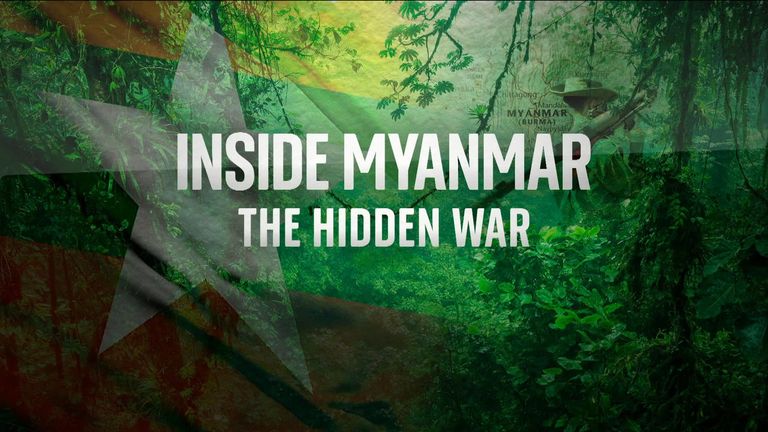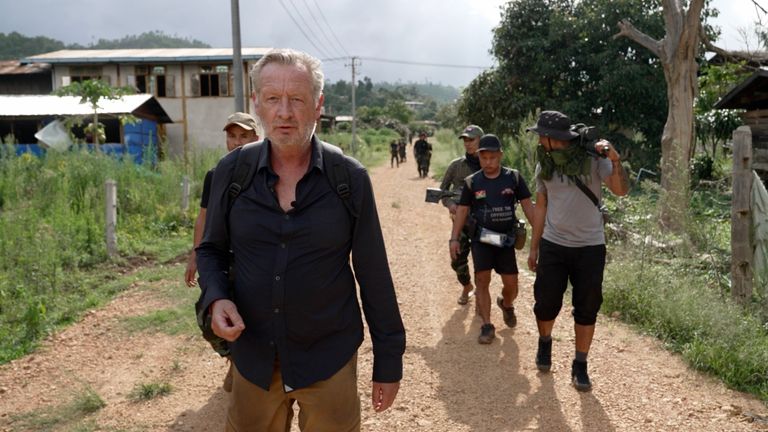Chief correspondent Stuart Ramsay and his team spent a month living in the jungle with the rebels, with the conflict raging - and found people brave enough to share their harrowing stories of survival and resistance against the army.
Thursday 9 May 2024

Sky News's reporting of the civil war in Myanmar has been recognised at the Amnesty International UK Media Awards.
The channel was the winner in the Broadcast News category for Myanmar's Hidden War.
Sponsored link
Chief correspondent Stuart Ramsay and his team spent a month last year living in the jungle with the rebels, with the conflict raging - and found people brave enough to share their harrowing stories of survival and resistance against the army.

Reflecting later on his time in the country, Ramsay wrote: "The jungle of Myanmar was to be our home for a month as we reported on a war that has been so rarely witnessed by outsiders.
"Our job was to gather the evidence of a conflict the junta denies and record the testimony of thousands of civilians forced from their homes by wave after wave of airstrikes, artillery shells, and infantry attacks."
Ramsay added: "We were always on the move, and changed camp frequently because you couldn't stay anywhere for too long because of the likelihood of spies spotting us and reporting back to the authorities.
"But we felt it was a risk worth taking, to bear witness to the incredible bravery of the volunteers, medics, doctors and nurses, working in horrendous and dangerous conditions - and to record the resilience of families, surviving and even thriving in an atmosphere of daily danger, death and destruction.
Related Topics: Myanmar
"Most of those we spoke to told us how instead of breaking their resolve, in many ways the Myanmar military is actually making that resolve even stronger."
Read more:
Inside Myanmar's secret jungle hospital
As war ravages Myanmar, locals have given up any hope of help
Amnesty says the annual awards highlight excellence in human rights journalism, as well as the bravery of journalists who risk their lives to uncover human rights abuses around the world and hold power to account.
Sacha Deshmukh, Amnesty International UK's chief executive, said: "The events of this year serve as a potent reminder that journalists and media workers continue to be threatened, prosecuted and even killed for speaking truth to power.
"It is clear that nowhere is truly safe for a journalist speaking truth to power right now.
"However, amid the global threats to press freedom, tonight's Media Awards winners and finalists have all proven that we will not be silenced."
He added: "Their tireless efforts truly make an impact on the world, and if brave media workers continue to document, investigate, and share the stories of those who often have no voice, change will happen."
Fighting in Rakhine state townships displaces 40,000 Rohingyas
2024.05.09
 Rohingya people protest in Buthidaung township, Rakhine state, Myanmar, March 19, 2024.
Rohingya people protest in Buthidaung township, Rakhine state, Myanmar, March 19, 2024.At least 40,000 ethnic Rohingyas have been forced to flee intense clashes between junta troops and the rebel Arakan Army in two townships in western Myanmar’s Rakhine state since the start of the week, and are now facing a humanitarian crisis, the displaced told RFA Burmese on Thursday.
The fighting in Maungdaw and Buthidaung townships came amid widespread gains in Rakhine state by the Arakan Army, or AA, that prompted the junta to implement a draft to shore up depleted troop losses.
As part of its efforts, the military has reportedly forcibly recruited Rohingyas into pro-junta militias which it says must be formed to protect their Muslim faith in majority Buddhist Rakhine state.
But observers say the junta is trying to stoke ethnic tensions in the region to slow the Arakan Army’s advance.
Nay San Lwin, a Rohingya rights activist who is monitoring the situation, said that the 40,000 first began to flee on Monday and hail from more than 10 villages, including Buthidaung’s Ka Kyet Bet, Ah Lel Chaung and Ba Gon Nar villages, and Maungdaw’s Paung Zar and Hla Baw Zar villages – all of which are located in close proximity to the fighting.
“Rohingyas are not allowed to take shelter at IDP [internally displaced people] camps, so they will not receive humanitarian aid,” he said. “Between 40,000 and 50,000 Rohingyas – including women, children, the elderly and the disabled – have been forced to flee from the villages in Buthidaung and Maungdaw.”
Nay San Lwin said that the number of displaced was confirmed after speaking to Rohingyas from the villages by phone over the last three days.
Rohingya sources say the situation in Rakhine state has grown increasingly complex in recent weeks and that members of their ethnic community are being exploited and oppressed by both the military and the AA.
Rohingya activists estimate the Rohingya population of Buthidaung to be around 200,000 and of Maungdaw to be some 80,000, totaling nearly 300,000 people. Those who have fled since Monday account for nearly 15% of the Rohingya population in the two townships.
Warned to flee by AA
A Rohingya resident of Maungdaw township who, like others interviewed for this report, spoke on condition of anonymity due to security concerns, told RFA that his escape was prompted by warnings of impending clashes from the AA.
"The AA told us that there would be a fight here, so we fled," he said, adding that the ethnic rebels advised seeking shelter in urban areas to avoid junta heavy artillery and airstrikes. “The AA didn’t attack us, they urged us to flee.”
Attempts to contact AA spokesperson Khaing Thukha about the situation in the two townships went unanswered Thursday.

Armed conflict escalated in Maungdaw in May, and the Rohingya resident said that while the junta has bombarded the township, the pro-junta No. 5 Border Guard Police Force, based in Maungdaw’s Myo Thu Gyi village, has “opened fire every day.”
A Rohingya from Buthidaung called the situation there “life-threatening.”
"We are not safe at all and have already been targeted in an airstrike,” he said. “I have fled with all of my family members from the conflict areas. People from six or seven villages have run away … Now we are facing difficulties getting food.”
He went on to say that Rohingyas from Maungdaw and Buthidaung had been unable to flee to urban areas and were forced to take shelter in nearby villages.
Ethnic Rakhines also at risk
Other residents told RFA that ethnic Rakhines have also been fleeing Maungdaw and Buthidaung townships.
On Tuesday, RFA reported that junta troops and their pro-junta Rohingya militias set fire to nearly 50 houses in Maungdaw’s Shwe Yin Aye and Wai Thar Li villages from May 6-9.
RFA was unable to reach Attorney General Hla Thein, the junta’s spokesperson for Rakhine state, for comment on the situation in Maungdaw and Buthidaung on Thursday.
In a message posted to the social media platform Telegram on Wednesday, AA spokesperson Khaing Thukha accused the junta of forcibly recruiting Rohingya from camps for the displaced in neighboring Bangladesh, where nearly 1 million languish after fleeing ethnic violence in Rakhine state in recent years.
He also condemned insurgent groups the Arakan Rohingya Salvation Army, the Arakan Rohingya Army and the Rohingya Solidarity Organization for claiming that they had aligned with the AA to fight junta troops.

The same day, Rohingya refugees told RFA that the Arakan Rohingya Salvation Army and the Rohingya Solidarity Organization had forcibly recruited “at least 500 people” for military service from camps for displaced Rohingyas in Bangladesh’s Cox’s Bazar between April 29 and May 8.
The Arakan Rohingya Salvation Army, the Arakan Rohingya Army and the Rohingya Solidarity Organization have not made any announcement about recruitment at the camps.
Residents of Rakhine state say that more than 2,000 Rohingyas have been forcibly taken for conscription from the capital Sittwe, and the townships of Kyaukphyu, Buthidaung and Maungdaw since February, when the junta announced it was implementing the military service law.
More than 166,000 people have fled their homes amid the conflict in Rakhine state, according to the United Nations Office for the Coordination of Humanitarian Affairs. The fighting began in November, when the AA ended a ceasefire agreement that had been in place with the military since it seized power from Myanmar’s democratically elected government in a February 2021 coup d’etat.
Translated by Aung Naing. Edited by Joshua Lipes and Malcolm Foster.

No comments:
Post a Comment